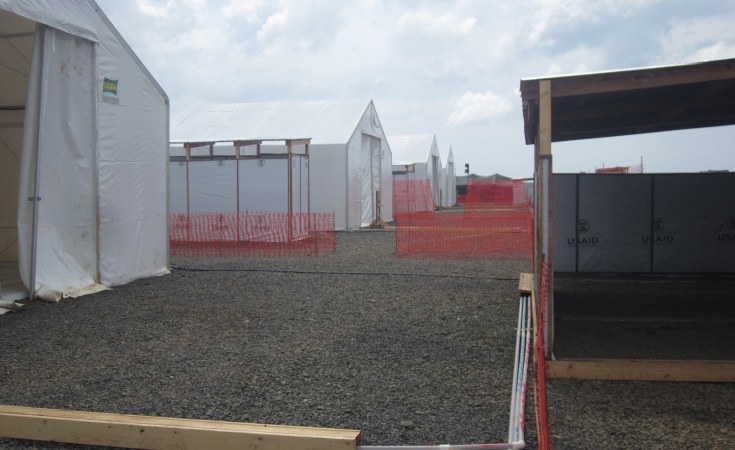The incidence of reported Ebola cases is no longer increasing nationally in Liberia, enabling the United States government to consider scaling back the number of Ebola Treatment Units (ETUs) it is building in the country. But while there is debate among some Liberians about how many new facilities are still needed, those building them are determined to "keep the accelerator... down until Ebola is gone from Liberia." AllAfrica's Boakai Fofana reports from Buchanan on the opening of the first completely American-built ETU in the country.
Locals watched in awe from a distance as dozens of United States Army engineers prepared to take journalists on a guided tour of a newly-built Ebola Treatment Unit in the port city of Buchanan, about 70 miles southeast of Monrovia.
A few children scavenged in a pile of building waste from the 100-bed facility, as grown-ups looked on, unperturbed. And the adults were justified in their lack of worry, according to 32-year-old Albertha Dunn. Not only had the new unit admitted no patients yet; even during the heyday of the epidemic in Liberia, the city was not greatly affected.
"I only heard on the radio one time that we had about 12 persons with Ebola in the county," she said. Albertha believes Grand Bassa County, where Buchanan is situated, was saved from the scourge by God. "We have been having strong prayers here". But she added that people have stopped shaking hands and they follow the preventive measures laid down by health workers. The mother of five had been coming out every day to watch the month-long construction of the facility with another concern: she's hoping to get a job as a cook.
In September, President Barack Obama authorized the deployment of thousands of American soldiers to help corral the Ebola outbreak which was ravaging Liberia and some of its neighbors. Their mission included building 17 treatment centers and training thousands of local health care workers. But as the World Health Organization (WHO) and the U.S. Centers for Disease Control begin to report that the outbreak is stabilizing in Liberia, officials are reassessing their strategy.
"If you look back to August, we were all under attack," said Mia Beers, the leader of the USAID Disaster Assistance Response Team for the Ebola outbreak in West Africa. She announced that because the nature of the epidemic is changing, they were looking to build 15 ETUs instead of the planned 17, so that there will be one in each of the counties. "The strategy now is to go out in the rural areas and really hunt down Ebola," she added, warning that although the numbers have dropped, "the fight is not over".
The Buchanan unit is the first exclusively built by U.S. Army engineers and sits on more than four acres of land outside the city. The few units already constructed in other parts of the country were built in collaboration with either the Armed Forces of Liberia (AFL) or local contractors. Major General Gary J Volesky, who heads the U.S. military mission to Liberia, praised the role of the AFL: "With our Armed Forces of Liberia brothers, we are going to complete all the ones... under the current plan," he said at the opening.
In addition to the ETUs donated by the Americans, facilities are being built by donors including WHO and the Chinese government, who have brought in 160 military health workers to staff a U.S. $41 million facility they are constructing at the country's international sports stadium. But with two-thirds of the hundreds of beds currently available empty, according to the Liberian health ministry, and WHO's recent announcement that Ebola is "no longer increasing" across the country as a whole, pundits are beginning to question the rationale for building more.
"They would be fools to spend all that money on ETUs," Stephen D. Cashin, chief executive of the Pan African Capital Group, told the New York Times. He suggested that some of the money be spent on putting in place the expertise and skill sets needed "to provide care to the masses of people of Liberia". However, not everyone sees it that way, and along with the Liberian government, aid organizations warn against the country letting its guard down.
Lifting the 90-day state of emergency imposed at the height of the epidemic, President Ellen Johnson Sirleaf cautioned Liberians that "until the national goal of zero-new-cases by Christmas is achieved all across the country, we will keep many of the previous measures in place." She said notwithstanding the gains, "a number of our compatriots are still lying in ETUs, hot-spots are springing up in rural areas, and many are still dying of Ebola."
General Volesky echoed the president's point at the unveiling in Buchanan: "We are going to keep the accelerator on that car down until Ebola is gone from Liberia." He announced that the U.S. is bringing in three more mobile labs to be deployed in the southeastern counties.


